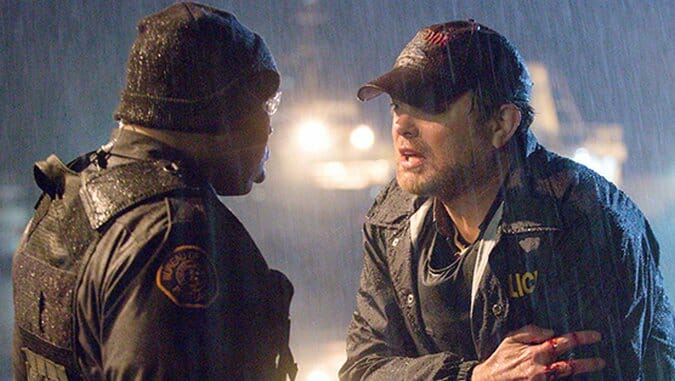Backstrom: “Dragonslayer”

The series premiere of Backstrom opens on a chalk-pale, flabby, middle-aged torso, nominally hairy and dotted by two tiny nipples. This is “the full Backstrom package” in all of its off-putting glory; that it’s provided to us so early is a dependable gauge on whether or not you’re on board to endure another “genius, white, aging male asshole” antihero-type television protagonist.
The torso belongs to Detective Lt. Everett Backstrom (Rainn Wilson), a thorn in the side of the Portland Police Department—as well as in the side of pretty much everyone in his life. Coupled with his unhealthy, shapeless body are all kinds of quirky goodies like antagonistic homophobia, predictable misogyny and casual racism. In other words, Wilson does not look good.
And so, within 30 seconds of the pilot episode, Backstrom makes two racist comments, one aimed at his Indian doctor, a poor sap unfortunately named Deb, and one which, like your 90 year-old grandfather’s favorite holiday banter, distinguishes between Asian Indians and North American “Indians.” This, accompanied by Deb’s listing of such maladies as “hypertension” and “enlarged heart” (ironic symbolism: check), means that our protagonist is one hot, cantankerous jerkwad of a mess. When Backstrom leaves the room (after insulting Dr. Deb’s name, of course), he declares that none of this matters: Everett Backstrom is not afraid of death. Thus begins our character’s narrative arc. Will Backstrom ever respect life enough to fear death? Let’s find out!
If you’re able to overlook how, given everything that’s happened in America in the past six months, the presentation of a police officer as a tolerated bigot is somehow funny—and really, there’s no reason you should be able to—then there’s also the point of Backstrom’s brilliance as a homicide detective, a characteristic we’re just expected to believe. As the episode opens, we learn that Backstrom’s been relegated to traffic duty due to some previously unsavory behavior, but that he’s set to get back into the homicide game. Unlike House—FOX’s other popular, episodic procedural about a genius, white, aging male asshole—Backstrom isn’t really concerned with trotting out its lead’s impressive deductive skills. Instead, this ability is just a given, shown cursorily through Backstrom’s gimmicky pseudo-empathic monologues in which he dons the “personality” of whomever he’s questioning in order to figure out a suspect’s motivations. Basically, it’s a “I’m a stripper who’s in love with a rich college student” or “I’m a drug dealer taking over Cambodian turf” kind of thing.
What Backstrom really wants to investigate is what’s behind such a hot, cantankerous jerkwad of a mess. What made him like this? An initial explanation is proffered: that Backstrom’s dad, a celebrated Portland police officer, was abusive. In one scene, Backstrom unveils to Sgt. Niedermayer (Kristoffer Polaha) a scar on his scalp from when, as a young boy, his father pistol-whipped him. The reveal is more to throw off Niedermayer, a member of Backstrom’s newly reconstituted team of investigators given to quoting philosophers and armchair psychoanalysis (though, to the character’s credit, he’s a relentlessly friendly fellow, which means that Backstrom hates him)—but this confession of physical abuse lends some explanation to the fact that, despite years of police duty, Backstrom still barely knows how to operate a firearm, let alone ably aim one.
Next to Niederman, the rest of Backstrom’s team is populated by fiercely intelligent archetypes who, should the show find an audience—and I think it will, given our collective propensity for shows about genius, white, aging male assholes—will develop some depth outside of being people who either accept Backstrom’s assholishness or regularly and openly chastise him. There’s Detective Gravely (Genevieve Angelson), Backstrom’s moral compass, her face almost always set in a grimace, and who, more than once, is proven to be a tad too idealistic for her trade. There’s the smoothly-named Detective Sergeant John Almond (Dennis Haysbert), who seems to have a long enough history with Backstrom to pretty much just overlook all of his terrible behavior. If, in future episodes, Almond starts talking about how little he cares about Backstrom’s crappy attitude because, hell, he’s too close to retirement—well, that would make perfect sense; that’s just the role he fills.
-

-

-

-

-

-

-

-

-

-

-

-

-

-

-

-

-

-

-

-

-

-

-

-

-

-

-

-

-

-

-

-

-

-

-

-

-

-

-

-








































